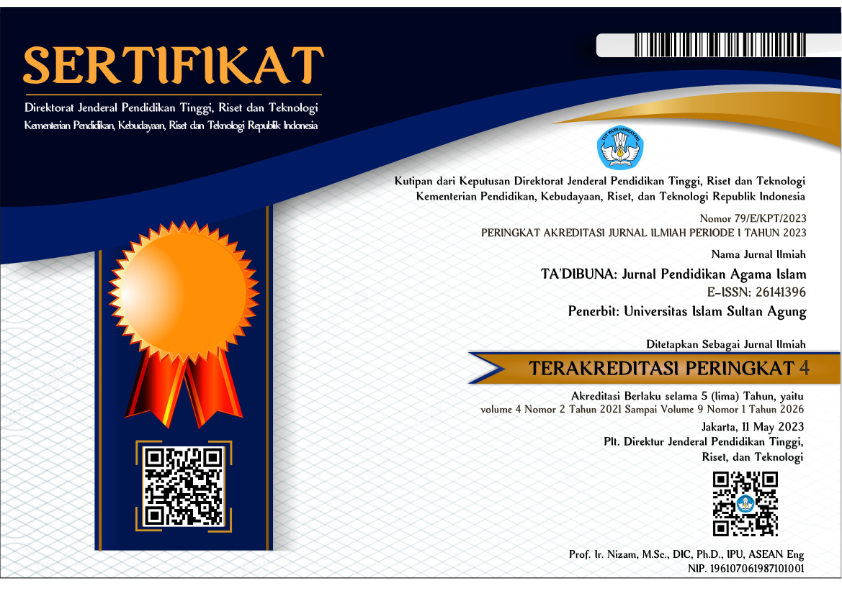Islamic Teaching for Generation Z: Inclusive and Creative Approaches in the Book "Islam for Gen-Z"
Abstract
This study aims to analyze the inclusive and creative approach in Islamic education for Generation Z based on the book Islam for Gen-Z by Hatim Gazali. The method used is qualitative research with a content analysis approach and literature review. This study found that Generation Z, who live in the digital and diversity era, understand religious teachings better through an open and interactive approach. Inclusive education allows students to be actively involved, respect differences in views, and appreciate Islamic values such as justice, tolerance, and equality. In addition, the use of digital technology, such as social media, supports student engagement and makes learning more relevant. The results of the study indicate that the inclusive approach is effective in deepening religious understanding in Generation Z, despite challenges, such as conservative resistance and the need to improve educator skills
Keywords
Full Text:
PDFReferences
Aditya, Rizky. (2022). Meningkatkan Keterlibatan Pelajar Melalui Metode Pembelajaran Interaktif. Jurnal Pendidikan dan Kebudayaan, 7. 45.
Ahmad, S. (2021). Islamic Education in the Digital Age: Relevance for Gen Z. Journal of Islamic Education Studies, 14(2), 36-47.
Aini, Siti Nurul. (2021). Persepsi Generasi Z Terhadap Pendidikan Islam: Tantangan dan Peluang. Jurnal Pendidikan Islam 3. 28.
Aisyah, Siti. (2023). Lingkungan Belajar yang Inklusif dan Implikasinya terhadap Keterlibatan Siswa. Jurnal Pendidikan dan Kebudayaan, 4. 67-75.
Ali, R. & Nisa, H. (2023). Inklusivitas dalam Pendidikan: Membangun Keterampilan Sosial Siswa. Jurnal Pendidikan Karakter 7. 23-30.
Arafat, M Yasir. (2021). Karakteristik dan Tantangan Pendidikan untuk Generasi Z. Jurnal Pendidikan Islam Modern ,15.
Cakir, O. (2021). Digital Literacy in Islamic Education: Challenges and Opportunities. International Journal of Islamic Education, 9(2), 33-45.
Creswell, John W. (2014). Qualitative Inquiry and Research Design: Choosing Among Five Approaches. Los Angeles: Sage Publications.
Esposito, J. (2020). Islam in the Digital Age: The Role of Media in Bridging Understanding. Oxford: Oxford University Press.
Gazali, Hatim. (2022). Islam untuk Gen-Z. Jakarta: Penerbit ABC.
Goh, P., & Sandars, J. (2020). The Impact of Multimedia in Enhancing Learning in Education. Journal of Educational Technology, 11(1), 12-25.
Hidayah, Nurul. (2021). Diskusi Terbuka dalam Pendidikan Agama: Metode dan Manfaat. Jurnal Pendidikan Islam Modern, 5. 15.
M. A., Zulkifli. (2022). Penggunaan Media Sosial dalam Pendidikan Islam: Studi Kasus di Sekolah Menengah. Jurnal Pendidikan Islam Modern, 3. 42-58.
Saussure, R., & Awan, M. (2021). Personalization and Inclusivity in Digital Learning for Religious Education. Contemporary Issues in Digital Education, 5(3), 78-89.
Shahrul, Aminah. (2023). Penerapan Media Digital dalam Pendidikan Agama. Jurnal Ilmu Pendidikan ,9. 12.
DOI: https://dx.doi.org/10.30659/jpai.7.2.203-214
Refbacks
- There are currently no refbacks.
Ta’dibuna: Jurnal Pendidikan Agama Islam is published by the Master Program of Islamic Education, Faculty of Islamic Studies, Universitas Islam Sultan Agung (UNISSULA), Indonesia.
Jl. Raya Kaligawe Km. 4, PO BOX 1054/SM, Semarang, Indonesia 50112
Email: jurnaltadibuna@unissula.ac.id








